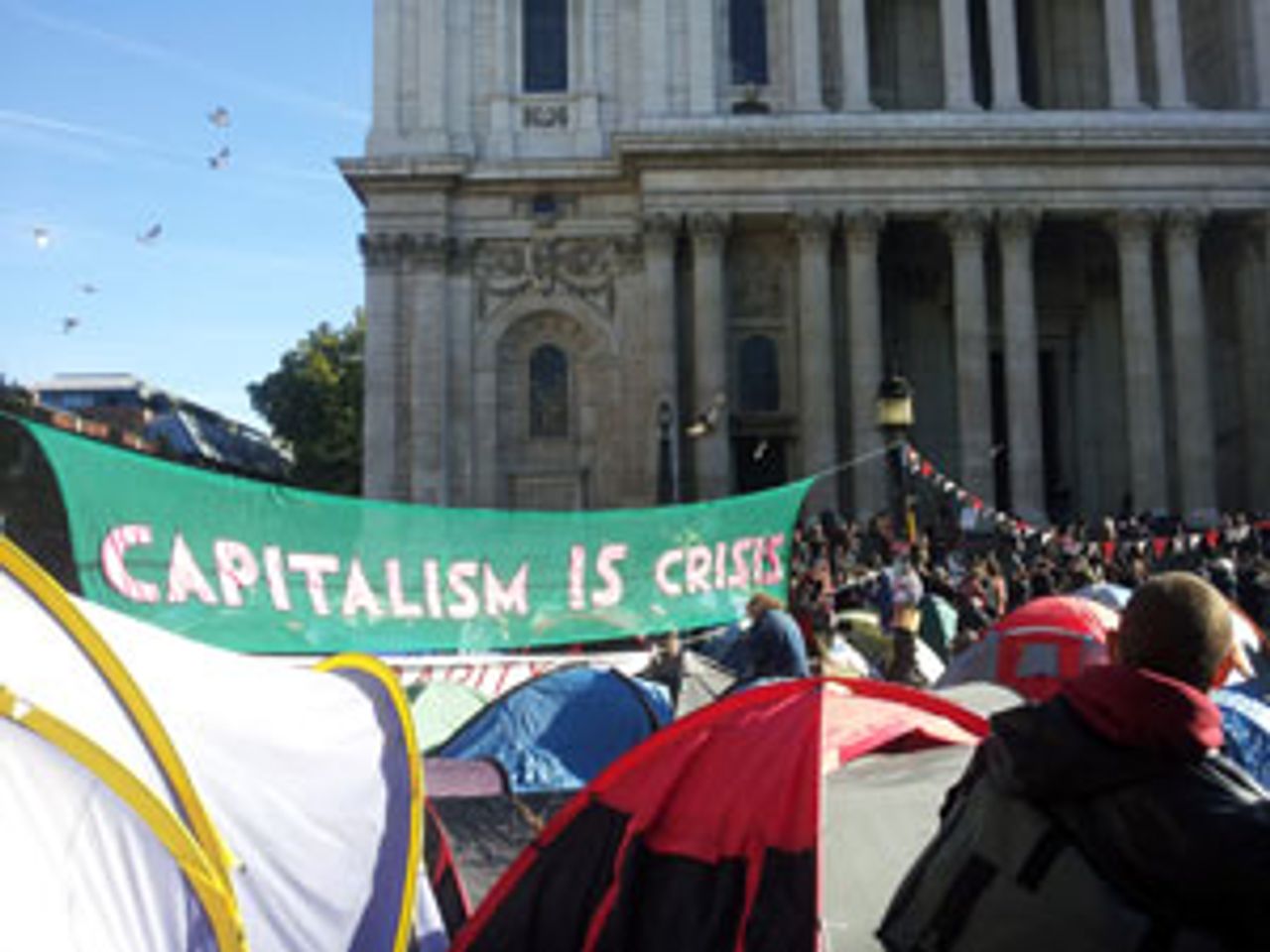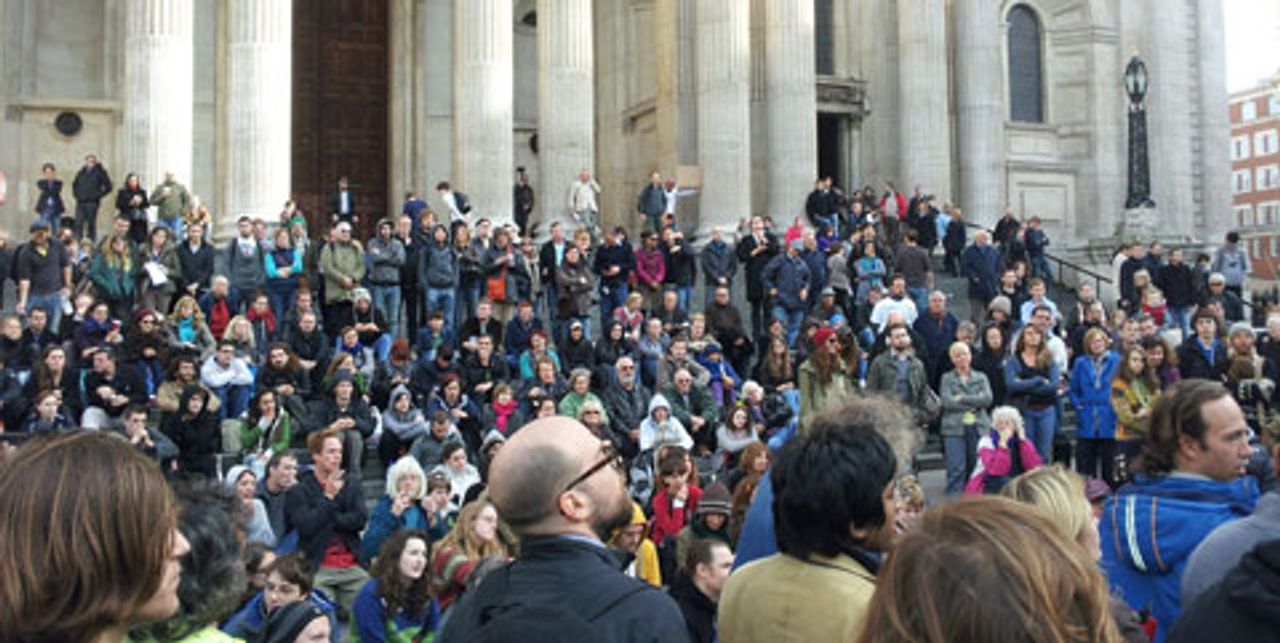Since October 15, when the Occupy London Stock Exchange camp was established outside St Paul’s Cathedral, a number of its organisers—made up of Labour Party supporters and members of various pseudo-left organisations—have insisted that “no politics” should be its guiding principle.
 Banner at the rally
Banner at the rallyTheir aim has become clearer in recent days, as debates at the occupation have been consciously shifted away from hostility to the capitalist system—and the demand for a struggle against it—toward a dialogue with the financial and political elite.
Throughout the occupation, camp spokesmen have urged bankers and financiers to join in the debate on the future of capitalism, assuring them they would be given the floor at the assembly. St Paul’s Cathedral management has previously offered to organise an event involving the City [London’s financial district] where protestors participate in discussions over how best to run the area.
The camp paper, the Occupied Times, contains a “for and against” argument, with the Anti-Anti Capitalist claiming the movement “contains many who aspire to go into business for themselves. And why not?”
The “no politics” platform has provided the freedom for a group of 17 unidentified individuals to produce a “manifesto” addressed not to working people, but appeals for the “democratisation” of the Corporation of the City of London.
The Corporation is an ancient body, which oversees the Square Mile, including the London Stock Exchange and the Bank of England. It has a number of archaic prerogatives, and its own police force and judicial system.
The manifesto calls for the removal of the most glaringly antidemocratic aspects of the Corporation, including an end to the block votes wielded by businesses in local elections, and a “truth and reconciliation” commission to examine the operations of the City.
What the plans actually mean is that the financial elite would maintain its position of power under the phoney guise of greater “transparency” and “accountability”. There is to be no genuine encroachment on the ill-gotten gains of the super-rich, nor is there any demand for a radical redistribution of wealth in favour of working people to address the huge growth in social inequality.
The manifesto draws heavily on the politics of the academic Maurice Glasman, adviser to Labour leader Ed Miliband, and architect of the “Blue Labour” project.
Blue Labour is a noxious blend of anti-immigrant chauvinism, and “anti-statism”, portraying the creation of the welfare state as the worst moment in Labour’s history. This is all dressed up with calls for limitations on finance capital, and a greater role for the trade unions, so as to ensure national cohesion.
Glasman has long been an advocate of measures to reform the Corporation. This policy has the advantage of detracting from a struggle against the profit system as a whole, while promoting what Glasman describes as “civic renewal”. Writing in the Guardian at the weekend, he welcomed the manifesto, claiming that it had “transformed the meaning of the occupation.”
 Meeting of Occupy LSX
Meeting of Occupy LSXAgainst the efforts to silence genuine anti-capitalist, i.e., socialist politics, the Socialist Equality Party distributed hundreds of copies of the World Socialist Website perspective, “Occupy Wall Street movement at a crossroads”, to those involved in the protest at the weekend.
Much of the debate at assembly meetings is on the practicalities of running the camp. This is another form through which the “no politics” agenda has been forced upon protesters. On Saturday, the last part of the debate was given over to “shout outs” —two minute slots when anyone is supposed to be able to address the crowd. Members of the SEP asked to speak and were told no political speakers were allowed to identify themselves and their political allegiance. Yet the first person to address the crowd was Labour MP John McDonnell—whose empty platitudes and calls for “solidarity” met a cool response from much of the audience.
Another speaker read a letter from Shami Chakrabati, director of human rights group Liberty, offering them a “neutral space” with which to enter discussions with the Corporation and St Paul’s. Other speakers implored the protestors to look to God and to live a minimalist lifestyle as a response to the growth of mass poverty.
This writer finally got the opportunity to address the protestors and identified himself as an SEP member. He described the importance of the international Occupy movement, and denounced the crackdown on protestors in the United States and Australia.
The SEP speaker insisted that “no politics” meant “not talking about oppositional politics, it means deferring to the existing political system.”
Rejecting demands for meetings with the Corporation, he called for a mass movement against social inequality, stressing that this must be international in both its character and programme. It was not the corporate and financial elite the protestors should be turning to: “What is required is a genuine democratic political debate and the broadening of this struggle out to working people.”
His remarks won a warm response from many, particularly amongst younger students and workers participating in the protest.
